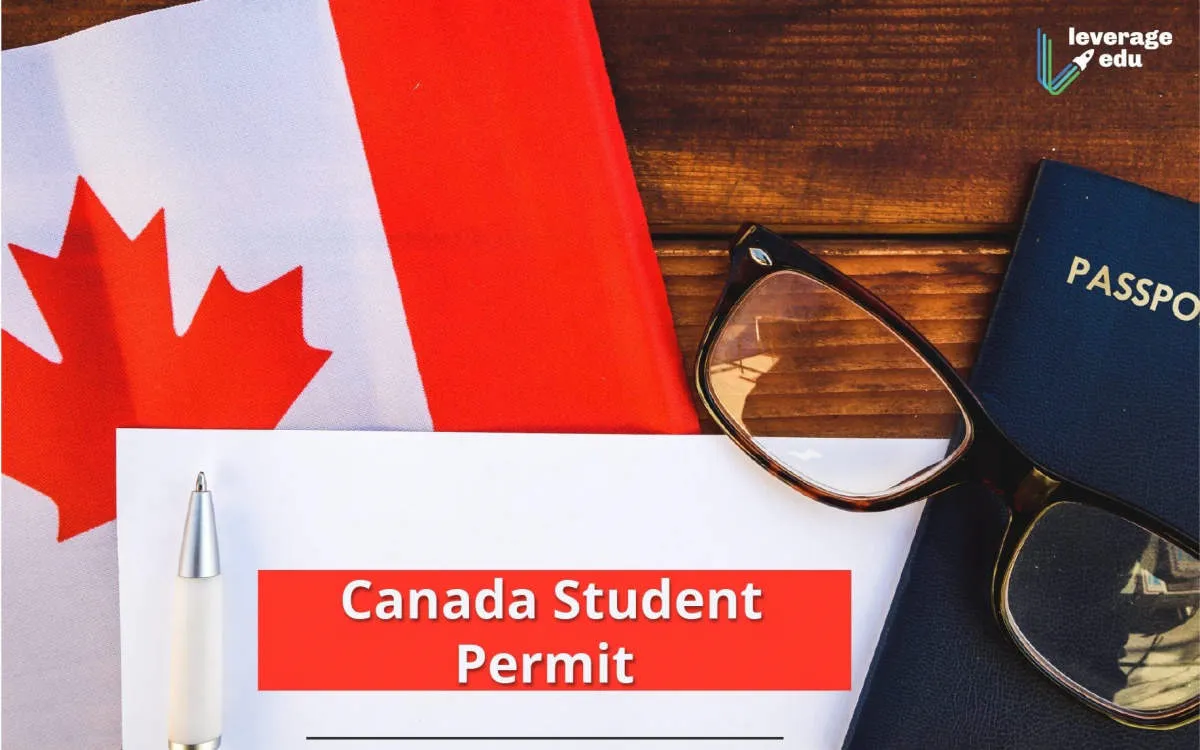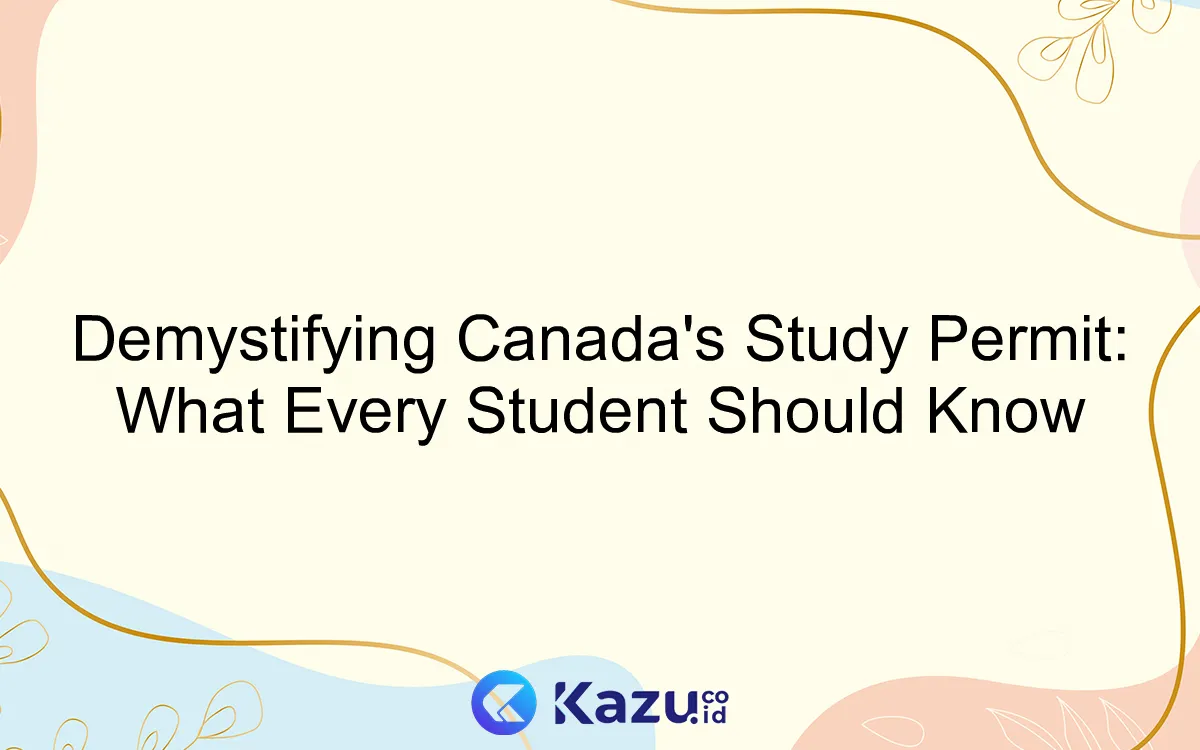Are you considering studying in Canada? Before you pack your bags, it’s crucial to understand the ins and outs of Canada’s study permit. In this article, we will demystify the study permit process and provide you with all the essential information every student should know. From application requirements to work opportunities, get ready to embark on your Canadian educational journey with confidence.
Understanding the Study Permit Application Process
Applying for a study permit in Canada can be a complex process, but with the right information, it can be demystified. Here is a breakdown of the key steps involved:
1. Eligibility
Before beginning the application process, it is essential to ensure that you meet the eligibility criteria for a study permit. This includes having an acceptance letter from a Designated Learning Institution (DLI) in Canada and proving your financial ability to cover tuition fees, living expenses, and return transportation.
2. Gather Documents
Next, you will need to gather the necessary documentation to support your application. This typically includes proof of identity, a valid passport, proof of language proficiency, educational transcripts, and a statement of purpose outlining your academic goals and intentions in Canada.
3. Online Application
Canada uses an online application system for study permits. You will need to create an account and complete the application form, providing accurate and detailed information. Be sure to double-check for any additional documents or forms required by your specific situation or country of residence.
4. Biometrics and Medical Exam
As part of the application process, you may be required to provide biometric information, including fingerprints and a photograph. Additionally, depending on your country of residence, a medical exam may be necessary to ensure you meet the health requirements for entering Canada.
5. Paying Fees
Applicants are required to pay the study permit application fee, which is non-refundable. It is important to check the current fee amount and ensure that it is paid before submitting your application.
6. Processing Times
The processing time for study permit applications can vary, so it is recommended to apply well in advance of your intended start date. You can check the estimated processing times on the official Canada Immigration website to get an idea of when to expect a decision.
7. Decision and Next Steps
Once your application has been reviewed, you will receive a decision on whether your study permit has been approved or denied. If approved, you will receive a Letter of Introduction which you will need to present to a border officer when you arrive in Canada. Make sure to carefully review the conditions of your study permit and adhere to them throughout your stay.
Remember, this article provides a general overview of the study permit application process and does not cover every specific scenario. It is always advisable to consult the official Canadian government website or seek professional advice when applying for a study permit.
Requisite documents and eligibility criteria

In order to obtain a study permit in Canada, students must meet certain eligibility criteria and submit a set of requisite documents. Here are the key requirements to keep in mind:
Eligibility criteria:
- Acceptance letter: Students must have an acceptance letter from a designated learning institution (DLI) in Canada.
- Proof of funds: Applicants must provide evidence that they have enough funds to cover tuition fees, living expenses, and return transportation.
- Good health and character: Students need to undergo a medical examination to prove that they are in good health. They also need to provide police certificates to demonstrate good character.
- Intent to leave Canada: Students must convince the immigration authorities that they have strong ties to their home country and intend to return after completing their studies.
Requisite documents:
- Valid passport: Students need a valid passport that will not expire during their stay in Canada.
- Completed application form: Applicants must fill out the appropriate application form, either online or on paper.
- Passport-sized photographs: Students need to provide recent photographs meeting specific requirements.
- Evidence of financial support: Students must provide bank statements or other documents to demonstrate their ability to afford the cost of studying and living in Canada.
- Academic transcripts and diplomas: Applicants need to submit their educational documents to prove their qualifications.
- Language proficiency test results: Depending on the program and institution, students may need to demonstrate their language skills through tests such as IELTS or TOEFL.
It is crucial to carefully review all the requirements and prepare the necessary documents to ensure a smooth study permit application process in Canada.
Working alongside your studies: permits and restrictions
When it comes to studying in Canada, many international students are interested in finding part-time work opportunities to support their finances and gain valuable work experience. However, it’s important to be aware of the permits and restrictions that apply to working while studying in Canada.
1. Study Permit Eligibility for Work
International students who hold a valid study permit are generally allowed to work off-campus while studying. However, it is essential to check the specific conditions and restrictions that apply to your situation.
2. Off-Campus Work Permit
If your study permit explicitly states that you are eligible to work off-campus, you can work up to 20 hours per week during regular academic sessions and full-time during scheduled breaks. It is crucial to adhere to these limitations to maintain your legal status in Canada.
3. Co-op Work Permits
Some study programs in Canada may require students to participate in co-op or internship opportunities as part of their academic curriculum. In such cases, students will need to obtain a co-op work permit in addition to their study permit.
4. On-Campus Work
Most international students are allowed to work on-campus without an additional work permit. However, it is essential to confirm with your designated learning institution whether you are eligible and any restrictions on the number of hours you can work.
5. Work Permits for Spouses
If you have accompanied your spouse or common-law partner to Canada, they may be eligible to apply for an open work permit, allowing them to work full-time for any employer during your studies.
In conclusion,
Understanding the permits and restrictions related to working alongside your studies is essential for international students in Canada. It is vital to consult with the appropriate authorities, such as Immigration, Refugees and Citizenship Canada (IRCC), to ensure compliance with all regulations.
Heading: Extending or changing your study permit in Canada
In Canada, students who wish to continue their studies or make changes to their study permit may need to extend or modify their existing study permits. This process allows students to legally remain in Canada while pursuing their education or making necessary changes to their study plans.
Here are some important points to know about extending or changing your study permit in Canada:
1. Study Permit Extension
If you need more time to complete your studies, it is essential to extend your study permit before it expires. Extension applications should generally be submitted at least 30 days before the expiration date of your current permit. It is crucial to continue to comply with all the conditions of your original study permit while waiting for the extension.
2. Eligibility for Study Permit Extension
To be eligible for a study permit extension, you must still be enrolled and actively pursuing your studies in a designated learning institution (DLI). You may also need to provide updated documentation, such as proof of finances, updated acceptance letter, and any changes to your study plan.
3. Changing Programs or Institutions
If you wish to change your designated learning institution or switch programs, you must inform the immigration authorities and obtain a new study permit that reflects these changes. This process ensures that you have the necessary permission to study at the new institution or in the new program. It is important to note that not all changes require a new study permit, but it is advisable to consult with the designated authorities to determine if you need to make any formal changes.
4. Applying for a Study Permit Extension or Modification
When applying for a study permit extension or modification, it is advisable to carefully review the requirements outlined by Immigration, Refugees and Citizenship Canada (IRCC). Submit all the necessary documentation, including the application form, supporting documents, and applicable fees. It is essential to follow the instructions provided by IRCC to avoid any delays or complications in the processing of your application.
Remember, extending or changing your study permit is a crucial process that allows you to continue your education journey in Canada legally. It is recommended to start the application process well in advance to ensure a smooth transition and avoid any disruptions to your studies or stay in Canada.
Conclusion
In conclusion, understanding Canada’s study permit is essential for every student planning to pursue their education in the country. By knowing the requirements, application process, and regulations, students can adequately prepare and ensure a smooth transition. It is also crucial to stay informed about any updates or changes in the study permit policy to avoid any complications during the application process.
